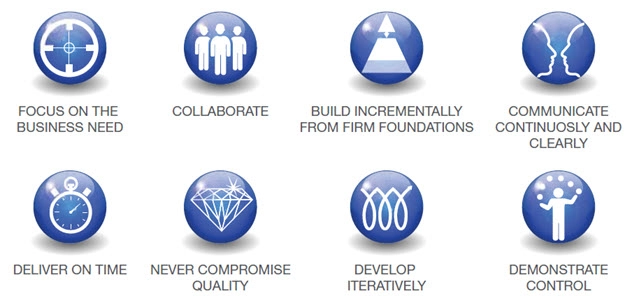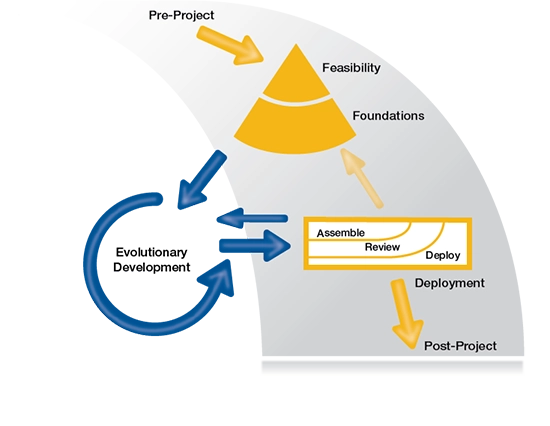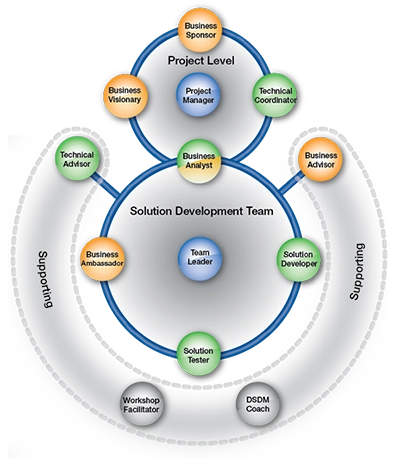Business analysis skills help an organisation to achieve its business goals by the analysis of the organisation's needs and the alignment of business projects to these needs.
Agile Business Analyst (Agile BA) offers useful, practical and in-depth guidance on the role of the Business Analyst working in an agile way (the Agile Business Analyst). As organizations and individuals embrace and transition to Agile ways of working, the roles of key personnel can evolve significantly, requiring fresh guidance, concepts and techniques. Prior to AgileBA, there was little in the way of detailed guidance directly addressing the role, responsibilities and skills of the Agile Business Analyst.


The Business Analyst's role is to study the overall business and information needs of an organisation, in order to facilitate solutions to business problems. The may involve:
Working in an agile project, the Agile BA has a threefold focus:
Given the evolving models of project and BAU delivery, AgileBA studies the overall business and information needs of an organisation, in order to facilitate solutions to business problems in the agile world of today.


We are uncovering better ways of developing software by doing it and helping others do it. Through this work we have come to value:
| Individuals and interactions | Over | processes and tools |
|---|---|---|
| Working software | Over | comprehensive documentation |
| Customer collaboration | Over | contract negotiation |
| Responding to change | Over | following a plan |

Brings together all elements of requirements lifecycle in an DSDM/ AgilePM context:
A complete guidance for successful Agile Business Analyst.



DSDM based AgilePM framework is based on following recommended organisational structure:


Agile Business Analyst (AgileBA) certification trainings are provided by APMG International's Accredited Training Organizations (ATOs) across the globe. Tecknologia is also an APMG Accredited Training Organization (ATO) offering Agile Business Analyst certification trainings across the globe and in various formats.
| Certification Level | Course Duration | Certificate Valid for |
|---|---|---|
| AgileBA Foundation | 3 Days | Lifetime |
| AgileBA Practitioner | 1 Day1 | 3 Years |
| AgileBA Foundation & Practitioner | 4 Days | As above |
Click on the link for certification level to explore the exam details.

Agile Business Analyst (Agile BA) offers useful, practical and comprehensive guidance on the role of the Business Analyst working in an agile way (the Agile Business Analyst).
Prices vary depending on the mode of delivery, location, deliverables and the quality of training delivery. Typically Agile Business Analyst online training costs between £1400 and £2200.
Following are the pass marks details for Agile Business Analyst exams:
Agile Business Analyst (AgileBA) qualifications have helped tens of thousands of professionals globally enhance their skills and achieve their professional ambitions. Professionals holding AgileBA accreditation stand a better chance of being invited for an interview and definitely stand a better chance being offered a role afterwards.
AgileBA can be a very valuable addition to the list of professional Agile and BA qualifications and accreditations which can help achieve professional growth within organisations, without a need to switch jobs/ employers.
Agile Business Analyst (AgileBA) has been, in the past, and is very much relevant today. Agile believes in being nimble and flexible and so does AgileBA which provides certified practitioners an added advantage over the crowd.
Agile Business Analyst (AgileBA) is definitely a good choice for beginners who aim at pursuing a career in business analysis, project management and related disciplines. Having AgileBA qualifications early in the career can play the role of a catalyst when it comes to climbing the professional ladder.
While Agile Business Analyst (AgileBA) certification exams are relatively hard, it is not rocket science and anyone with correct level of attention, training and devotion can definitely achieve success in the exams.
Agile Business Analyst (AgileBA) foundation pass rate (across the market) remains around 90% globally, and practitioner stands at 80%, in first attempt. Tecknologia takes pride in maintaining 100% pass rate so far (May 2024).
It is absolutely possible to achieve AgileBA exam(s) success while relying on self study. However, high quality AgileBA training can accelerate the process, along with exam success probability, for sure.
Agile Business Analyst (AgileBA) certifications are considered to be professional qualifications only. These qualifications are widely recognised and sought after globally, however, they are not the same as a college or university degree. Some quarters believe that AgileBA practitioner qualification is equivalent to UK NQF 5/6 - Tecknologia has no grounds to confirm this.
There is no negative marking in AgileBA exams. No marks are deducted for a wrong answer.
AgileBA Foundation certifications has no expiry while AgileBA Practitioner certificate has a validity of 5 years from issuance date. Candidate must retake both exams within 5 years to maintain their certifications..